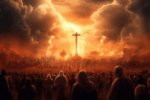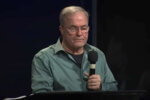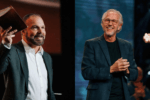Editor’s Note: The following word was first published on September 24 as a Prophetic Moments bulletin by R. Loren Sandford, pastor of New Song Fellowship in Denver, Colorado (newsongfellowship.org). Audio and video recordings of Sandford’s messages may be purchased on his church’s Web site.

Will the world end in 2012? I don’t believe so. But in that time period and leading up to it we will see an acceleration of instability and uncertainty in the world. This will not be a collapse, but rather an intensification of fear as the whirlwind of change across the globe gathers speed.
It will appear that major nations once at war with one another are making peace. In terms of the possibility of major wars, therefore, there will be a diminished sense of danger, while smaller conflicts in more localities will likely escalate, in both number and intensity. It will be a time of “wars and rumors of wars” (Matt. 24:6, NASB), but not on a world scale.
We will also see an increase in natural disasters in various places—earthquakes, volcanic eruptions, tsunamis, hurricanes and tornadoes. Earth can no longer bear up under the weight of the sin of mankind (see Matt. 24).
The coming turmoil will be felt primarily in global power shifts in both comparative military might and economic influence. These shifts are already taking place. America will remain a big fish in the world’s pond, but it will no longer be the only big fish in the world’s pond and will therefore feel itself diminished in terms of significance on the world stage.
These changes, among other influences, will lead to increased political turmoil and greater ideological polarization in America. We will be an increasingly divided nation with an escalating risk of erupting violence as frustration grows; ethnic and cultural groups see themselves disempowered; and people seek outlets for the fear and anger they feel due to not being heard by their government and/or other ethnic and cultural groups.
In days to come believers must not feed these divisions or participate in them at any level or in any way. We have been called as reconcilers who have been given a ministry of reconciliation, not division (see 2 Cor. 5:18).
That being said, no matter what we do, we will be increasingly marginalized culturally as a result of societal disfavor in days to come, but we must take care that our own attitudes and behavior in response to such disfavor do not draw unnecessary levels of opposition upon us.
In the years to come it will become more and more necessary that we live as the first and second century Christians did under the Roman Empire. They didn’t equate their Christian faith with a political movement or party as so many of us do today—”My kingdom is not of this world,” Jesus told his disciples (John 18:36)—but rather became known for their love when everyone else’s love grew cold. They openly modeled a moral and glorious lifestyle without issuing scathing condemnations of Roman immorality.
“See how the Christians love,” became the testimony of those who observed their character and their conduct toward one another as well as toward outsiders. It wasn’t that they didn’t address sin. They did, in fact, call for repentance, but left judgment, vengeance and condemnation up to God. This made them wonderfully attractive to growing numbers of Romans who were hungering for an alternative to the destruction brought on by the sin that infected the core of Roman society.
Historically, societal decay has always set the stage for revival because sin brings death—and death makes people hungry for healing. If we will set a course to be Christlike in days to come, we can turn the tide of disfavor and win multitudes to Jesus.
The years to come may therefore be tumultuous and fearful ones for the world, but if we will take our rightful places as ministers of the kingdom of God—a kingdom of love, service, and signs and wonders—the coming years will be the most glorious the church has ever known. Romans 8:19: “For the anxious longing of the creation waits eagerly for the revealing of the sons of God.” This is our hour! Matthew 24:14: “This gospel of the kingdom shall be preached in the whole world as a testimony to all the nations, and then the end will come.”
About the author: R. Loren Sandford is the founder and senior pastor of New Song Fellowship in Denver, Colorado (newsongfellowship.org). He is also the author of several books, including Understanding Prophetic People and The Prophetic Church (both published by Chosen).

Prophetic Insight is a weekly bulletin offering timely and relevant messages for the body of Christ from recognized prophetic voices. It is prepared by Maureen Eha, features editor for Charisma magazine. You can follow her on Twitter at MaureenEha. And please spread the good news by sending this e-newsletter to your friends and encouraging them to subscribe.







Leave a Comment
You must be logged in to post a comment.